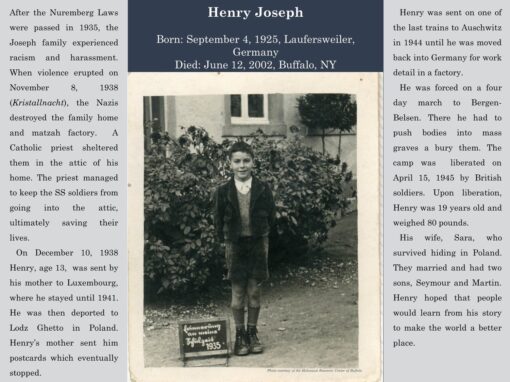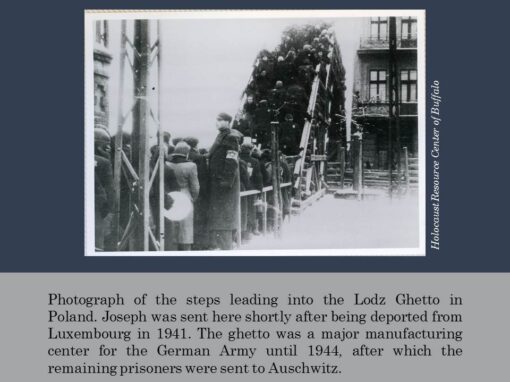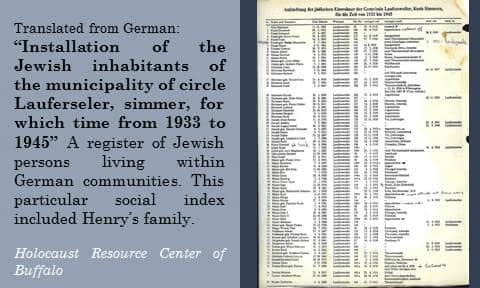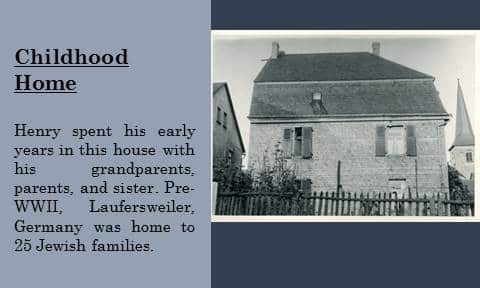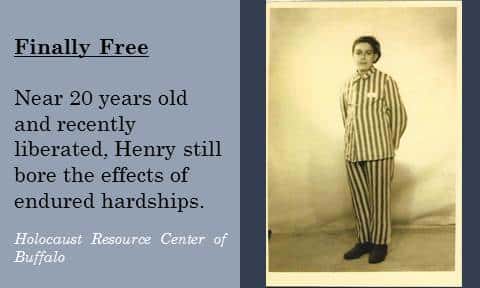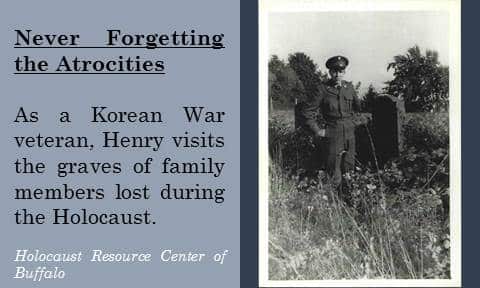Henry Joseph
Henry Joseph, born in 1925 in Laufersweiler, Germany, a small farming village, which had a population of about 600 including 25 Jewish families. He lived with his parents, grandparents, and sister. His family operated a Matzah factory and sold feed, coal, and flour.
Henry Joseph’s Biography
Henry was born in Laufersweiler, Germany in 1925. His household, consisting of his grandparents, his parents, his sister and himself, was one of 25 Jewish families in the town. The family earned a living operating a Matzah factory and selling feed, coal, and flour. Everything changed after his father died Feb 6, 1934, and his mom took over the business. When the Nuremburg anti-Semitic laws went into effect in 1935, Henry and his sister encountered increasing harassment at the Catholic school they were attending, eventually being seated separately from the other children. One of the teachers resigned because of his [distain] disdain for the anti-Semitic laws. Henry’s mother kept the bakery going until November 11, 1938 now commemorated as Kristallnacht, when their synagogue was partially burned, and only one person offered condolences, the Catholic priest. In their home, all 32 windows were smashed and their belongings stolen or thrown on the street; they were chased into the attic and back downstairs, and his grandfather was beaten mercilessly, to the point the people thought he was dead and threw him outside. Henry’s family tried to take refuge with the non-Jewish families in the community but no one accepted them out of fear for their own lives. Later in the night the Catholic priest took them in and gave them shelter in the attic of his home. When the SS came looking for the family, specifically for his grandfather, the Priest managed to keep them from going into the attic, so Henry’s family survived. After Kristallnacht his sister was sent to Holland for safety, and Henry to Luxembourg. His mother stayed in the town until 1942 when she was forced out. His sister was deported from Holland to Auschwitz April 17, 1942, at the age of 21. There are no reports that any of the 1,100 people deported with her survived.
Henry stayed in contact with his mother as best he could, and in 1941 he went back when his grandmother died, but he could not stay there because they would not allow Jews to move. Henry lived in Luxembourg from December 1938 to October 1941, where he was not allowed to go to school. During this time, he worked illegally in a blacksmith shop, staying on a visa and living with his relatives. In October 1941 he was deported to the Lodz Ghetto in Poland with 13 other relatives. He also had some family still in Germany, where he longed without hope to see his mother, who was still taking care of his grandfather.
Henry lived in a small room with all of his family during his time in Lodz and worked in a metal factory in the ghetto. He believes that because he stayed in the ghetto until the end of 1944 his life was spared, by the time he left he had lost 6 family members who had been sent out of the ghetto to other camps, as well as one of his uncles who had died of malnutrition while in the ghetto. He also believed that he stayed alive because another relative who worked in a food factory would give Henry’s family some extra food here and there. He was just old enough to be spared when they took all the children from the ghetto. His 7 ½ year old cousin was not so lucky; when they took her, her mother was beaten for not giving up her child. He was 19 in 1944 when the ghetto, being sent in September on one of the last trains out of Lodz to Auschwitz. There only he and a distant cousin were on the right side of the selection; all the others were sent to the ovens. He recalled the selection, when they unloaded in daytime towards Birkenau. He was lucky and was only in Auschwitz 2-3 weeks.
After his time in Auschwitz they were sent back into Germany by train and were put to work in Hanover in a Continental tire factory for several months. The people in charge of this new camp were non-Jewish murderers and were extremely cruel. The factory owner had a daughter his age who would now and then bring food to Henry and the man he directly worked under, which helped Henry to survive. After several months at the factory the allied bombings increased, forcing the prisoners into a bunker, despite at least one concerted effort to resist. Then they changed camps again, and for the last few months, they were working underground in Hanover, because the Nazis wanted the war factories protected from bombings. Henry was picked for a detail to clean the SS barracks and some of the SS would leave food for this detail; one of the elderly SS asked for him specifically because they had shared life stories. He was then put on a march to Bergen-Belsen, which he does not remember entirely, except that not everyone on the march survived. He believes the reason for the march was to get them away from the British liberators. After his rescue by British soldiers he began his recovery. Henry hopes that people will learn from his story, and that the world can be a better place.
CLICK ON THE IMAGES BELOW TO LEARN MORE ABOUT HENRY’S STORY
WATCH THE VIDEO BELOW TO LEARN MORE ABOUT HENRY’S STORY
CLICK HERE TO REQUEST A SPEAKER
Our speakers can present in person or online.
Our speakers are all volunteers. An honorarium to HERO is greatly appreciated. We are a non-profit organization and honorariums make a significant difference in our ability to continue our impactful work.
"*" indicates required fields


